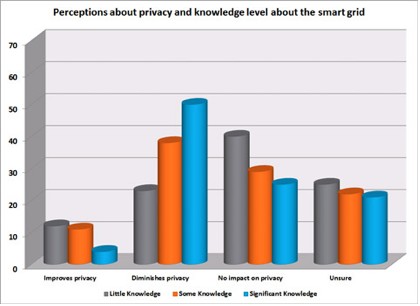Customer Service through effective, targeted Customer Communications: It’s just good business sense.
 Friday, April 1, 2011 at 05:27PM
Friday, April 1, 2011 at 05:27PM We’ve all witnessed and discussed increasing negativity among members of the general public when their neighborhoods become targeted for Smart Grid rollouts: Lawsuits, Grassroots Protests; Video Blogs; commentaries on YouTube videos; discussions and feedback in a variety of forums, and more. Much of this debate and disruption has been confined to smaller, isolated publications and special interest sites (e.g., local newspapers in rollout areas and sites like SmartGridNews.com). Utilities, with their monopolistic status secure, may feel little need to improve communication with their customers, assured as they are of a power (and water) hungry customer-base with limited options for alternate suppliers. However, complacency and hubris in business, as in other forums, have a historically significant track record of predicting major downfalls.
Now, even a major mainstream business publication, Forbes, has begun commenting-- critiquing and taking utilities and vendors to task for their disregard and general lack of understanding of the psychology of the modern consumer, as well as their perceived lack of interest in obtaining these insights. Recommendations found in recent Forbes coverage includes the following:
CIO Network’s Bob Lento observes the great effort people have taken both individually and collectively to oppose all sorts of Smart Grid relevant actions. These include direct blocking efforts by cities with meter bans and tower bans, and in one case even drafting a Smart Grid Bill of Rights. Despite these overt and effortful actions, there’s still relatively little impetus to change energy-usage behaviors. As Lento states: “John Doe …. is still doing his laundry during peak load hours, the utility is paying top dollar in infrastructure costs and high-cost backup power plants.” He advocates the pressing need for effective consumer education and outreach, allowing the consumers to “interact with companies through the contact channel of their choice, be it over the phone or text message or e-mail. Energy providers can give their customers energy use updates via alerts, charts, automated phone messages, text messages, chats, twitter updates and online portals. When utilities pour money-saving tips and information on ways to leverage their smart meter into every communications channel, consumers will listen and – maybe – begin to change.”
William Pentland of the Pace Energy and Climate Center views the dilemmas surrounding emerging awareness of Smart Grid even more darkly. He cites a study by the Ponemon Institute revealing that the more people know about Smart Grid, the less they like it. Although this study mostly concerned the cyber security aspect, it also reveals a significant level of public distrust of utility providers. This distrust will not be alleviated by maintaining a business-as-usual approach, Pentland asserts, but instead indicates the tremendous need for effective, targeted, customer-centered communication.

In a more recent article, Pentland traced the failure of pricing strategies to effectively motivate consumers to become more energy-efficient. During a record increase in fuel prices which resulted in increased electricity prices, New York’s Public Service Commission mandated an hourly electrical power pricing policy. Their action was intended to “send consumers price signals that accurately reflect the costs of producing the power they are consuming.” But rather than reducing demand at peak load times as intended, their actions actually resulted in increased usage during peak hours. Rather than changing their behaviors, commercial customers sought to insure themselves against potential increased costs by entering into “power-supply contracts with third-party ESCOs [Energy Service Companies] that limit their exposure to daily price fluctuations.” Had more effective campaigns encouraging changes in behavior been created and implemented, the city and utility would have increased their abililty to attain their desired results.
Instead, too many utilities persist with ineffective messaging strategies, utilizing the same channels they have always used. This stands in direct contrast to other businesses with which customers actually like interacting, and for which they are willing to pay a premium price due to the perceived value those businesses provide. “Federal Express allows their customers to track deliveries in real time as they travel to their door-step from virtually any corner of the world. While this is only a sliver of the information that flows through the Federal Express logistical juggernaut, it is more information than most electric utilities in the United States provide their customers.” Pentland accuses the utilities of clinging to outdated paper-based management systems. In an apt metaphor, he describes this as operating in “the dark ages of data management.”
The partnership between LA’s Department of Water and Power and USC’s Customer Behavior team offers a remarkable opportunity to revolutionize customer communications to motivate effective behavior changes and create willing - perhaps even eager - adoption of Smart Grid technologies. To do anything less than fully embrace this opportunity resembles Albert Einstein’s definition of insanity: “Doing the same thing over and over again and expecting different results.”
What is needed instead is an integrated partnership between experts in fields of Sociology, Communication, and Psychology to come together and develop effective public education and outreach campaigns. These can effectively develop programs consumers want to use, and on which they feel comfortable interacting with other service providers. For example, iPhone users have long been able to program their TiVos on DirectTV and other satellite/cable providers’ systems to record television programs while away from home. Smart Grid and related technologies offer the potential for similar remote control of home or business appliances. Will these dreams be realized in a user-centric manner? Or will they develop more along the lines of programmable thermostats, which although they offer great potential for control and energy savings, do so within a device most deem too difficult to program. In fact, although “these devices were thought to generate savings of 10 to 30 percent, and close to half of U.S. homes now have them. In 2006, though, the DOE stopped pushing the thermostats, which aren't cheap, after multiple studies showed the actual savings was zero — not because the inventors hadn't understood the laws of physics, but because consumers didn't use the things right. They couldn't figure out how to program the thermostats, didn't believe they'd work and so didn't bother, set the temperature higher during the day and thereby canceled out the savings from the setback at night, and so on.” (Adams, 2010)
To us, as social scientists, this situation offers a tremendous opportunity for communication, outreach, and educational programs to help vendors develop more user-friendly interfaces; educate the public on the devices effectiveness; create feelings of self-efficacy (e.g., “I don’t have to be a techno-geek to use this!”); reward them for their pro-social and energy-efficient behaviors by reminding them how much they’re saving in engaging and even entertaining ways.
We are very eager to examine which features of emerging energy applications catch on with the public, and determine why. Applications and appliances are being developed in a tremendous variety of forums, even by vendors who haven’t traditionally been in the energy business (e.g., Google, Cisco). When the telephone industry began to take tremendous leaps into cellular, digital, wireless and other technologies we take for granted today, they referred to these as PANS (Pretty Amazing New Stuff), as compared to the existing POTS (Plain Old Telephone Systems). The industry and their consultants spent tremendous time and funds surveying customers, running focus groups, and other efforts in order to develop the still improving smartphones and other devices that have achieved phenomenal popularity. AT&T alone almost tripled their Net Income from 2005 to 2009.
What had been the traditional phone utility evolved into a much broader array of services and communication technologies. “Approximately 70 percent of AT&T's revenues are generated by our growth areas of wireless, wireline data and managed services.” (Annual Shareholders Report, 2009) These are income streams from technologies which didn’t even exist, or were in their relative infancy, as little as a decade ago. Part of this industry transformation is no doubt due to the influx of expertise from what had been unrelated industries: Sony, Apple, Samsung and others manufacture far better phones than ever dreamed up in decades of designs from Bell Telephone Laboratories. Now my phone not only allows me to talk to people, but also to send text messages, check my email, surf the internet, program my television to record a show I won’t make it home in time to watch while it airs, access my bank account, read news articles, watch videos, get directions, take pictures, get the accurate time, and so much more.
In addition to assisting Smart Grid and related technologies into products and services people actually want to acquire and use, the Customer Behavioral team of experts is also focused on developing intervention and educational strategies. It will be beneficial to develop more effective messaging strategies for LADWP’s existing communications technologies (e.g., Billing Inserts, Web Pages, Interactive Voice/Telephone Systems and Call Centers). Rather than simply presenting the usage and cost information, more effective billing statements might include gain-framed messages. For example, providing information tailored to specific customers’ usage patterns, identifying a few effective energy usage changes they could make to reduce their overall bill. Alternately, messages could encourage and praise those customers who are already taking steps to cut their usage.
Developing targeted messages to provide customers with information meeting their individual interests and needs, using new and emerging communication methods to communicate with customers, and being responsive as energy usage patterns change will help LADWP ensure they are able to roll out Smart Grid and related technologies to a receptive – rather than resistant – consumer base.
References
How The Smart Grid Fell From Grace And What To Do About It (2/17/11)
Why Smart People Are Suspicious of Smart Meters (12/10/10)
http://blogs.forbes.com/williampentland/2010/12/10/why-smart-people-are-suspicious-of-smart-meters/
As Power Grid Gets Smart, New Yorkers Scramble to Stay Dumb (2/4/11)
Dark Grid: Electric Utilities Scramble to Get Smart (11/22/10)
The Smart Grid's Struggle
Cecil Adams (12/3/10) Does turning down the thermostat at night save energy? http://www.straightdope.com/columns/read/2970/does-turning-down-the-thermostat-at-night-save-energy
AT&T’s Annual Report to Shareholders for 2009. Available at: http://www.att.com/gen/investor-relations?pid=17388#cl
